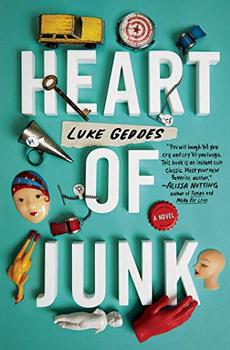Summary | Excerpt | Reviews | Beyond the Book | Readalikes | Genres & Themes | Author Bio

It was a doll, not just any doll, but one fashioned in the likeness of a man named MC Hammer, whom Margaret—though she'd never cared for popular music, preferring opera and classical—recalled as a rap musician she'd watched, despite herself, perform his clangorous so-called songs on many late-night talk shows in the nineties. The man, with his ridiculous circus pants and a swagger that intimated violence, had been inescapable. Margaret especially did not care for rap music or whatever nonsense name it was called by now. The doll was of compatible dimensions with the Barbies and Kens that Delores Kovacs sold in Hall Two, and manufactured by the same company. With horror she pictured it, in its distasteful sparkling outfit, cavorting with the clean-cut figures of her childhood: staring out of those still, white eyes and flashing that menacing grin as he reclined on the DreamHouse sofa, his arm around Barbie, stripped down to her black-and-white underthing, a nearby boom box quaking with the cacophonous beat of the bonus cassingle the box boasted was included inside, while poor Ken lay dead on the floor, shot up by the rapper himself.
Seymour must have noticed her looking, because he held the doll close to her face. "I know," he said. "Isn't it hysterical?"
Margaret pinched her lips and nodded. There was junk and there was—even in her thoughts she pardoned her French—shit. The Pac-Man beer stein was one thing, the My Secret Princess play set quite another, but this—this was just too much. Something would have to be done about it. She would see to it that something was done. She nodded a curt goodbye to Seymour, walked down Memory Lane, turned the corner at Good Deal Avenue, and stopped in the lounge/café area at the intersection of Good Deal and Fancy Street.
The mall was so immense—nearly two hundred thousand square feet, featured upon its opening in Martha Stewart Living magazine as the largest year-round antiques market in the state of Kansas—that, for the benefit of fatigued customers, rest areas such as this had been strategically placed around the building near the bathrooms. There sat a large TV on mute tuned to the listings channel, an old couch and a couple of recliners (not antique, not collectible, but flannel thrift store cast-offs), a couple of humming vending machines, an "old fashioned" popcorn cart, and—thank heavens—Heart of America co-owner Keith Stoller, hunched over the surface of a wobbly card table with the focus of a monk as he collated a mess of papers into neat stapled packets.
"Keith," Margaret said as she took the seat across from him, "I'm so glad you're here."
"Just getting some stuff ready for the meeting." Keith, an astonishingly short man with a pale comb-over on an even paler scalp, whose clothes were forever haunted by stains of mysterious origin, and whom frankly Margaret could sometimes scarcely bear to look at, kept his eyes trained on the papers. "Lindy Bobo Action Plan," the cover sheet read, referring to the local toddler, a beauty pageant champion already something of a regional celebrity, who had recently gone missing. Margaret felt for the little girl and her family, she truly did. The world could be so wicked. But the Heart of America was supposed to be a haven from the wicked outside world, offering respite from the stresses and calamities of modern life. Littering the rest area with such stark reminders of the brutality people came here to escape ruined the ambience, to say the least.
"We have a problem," Margaret said to Keith's bald spot. When he didn't look up, when he continued to slap slap slap the stapler with machine-like efficiency, when it became clear he was ignoring her, she added, at a volume that surprised even her: "A big problem!" Keith recoiled and knocked some papers onto the floor. Margaret made no move to pick them up. Now that she had his attention, she continued. "As you may or may not know, you've got a pair of new vendors under your charge. They've taken over—completely—Patricia's booth."
Excerpted from Heart of Junk by Luke Geddes. Copyright © 2020 by Luke Geddes. Excerpted by permission of Simon & Schuster. All rights reserved. No part of this excerpt may be reproduced or reprinted without permission in writing from the publisher.
From the moment I picked your book up...
Click Here to find out who said this, as well as discovering other famous literary quotes!
Your guide toexceptional books
BookBrowse seeks out and recommends the best in contemporary fiction and nonfiction—books that not only engage and entertain but also deepen our understanding of ourselves and the world around us.